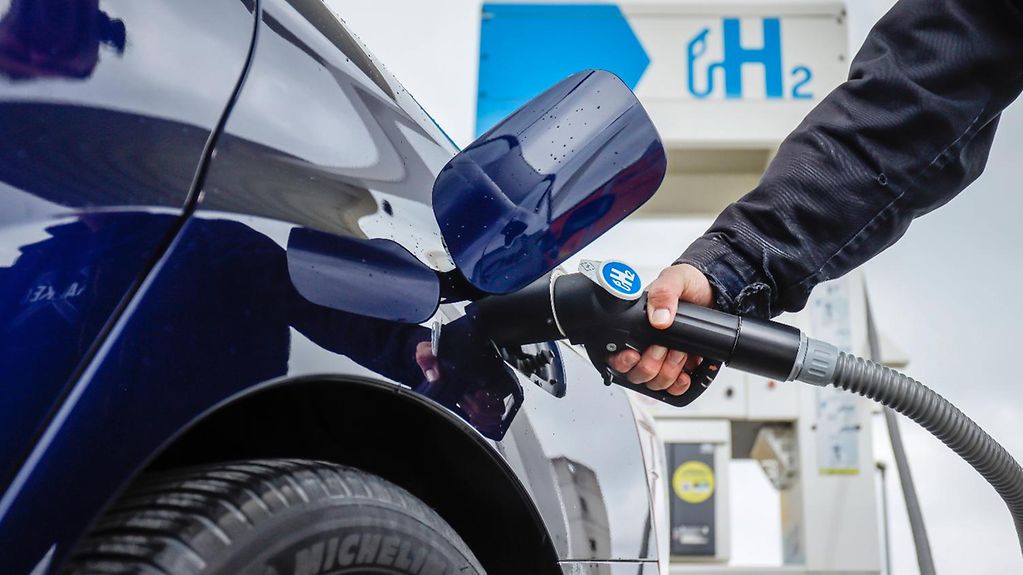Major impetus for the energy shift
Alongside renewable energy and greater energy efficiency, a new pillar is to be added to Germany’s energy shift – hydrogen. At a Cabinet meeting, the German government has now adopted a hydrogen strategy. A total of nine billion euros are to be invested in making hydrogen a marketable fuel.
3 min reading time

When produced using renewable energy, hydrogen is a sustainable, flexible and easily transportable fuel.
Photo: imago images/Rupert Oberhäuser
The hydrogen strategy aims to make Germany the world’s leading provider of modern hydrogen technologies. To this end, the government will be supporting hydrogen technologies so that they can swiftly prove their value on the market and establish their own value chains. The strategy is not based on any one technology, but is open. The support does, however, focus on "green" hydrogen.
Nine billion euros for hydrogen
Specifically, seven billion euros are earmarked for promoting hydrogen technologies inside Germany, while two billion are designated for international partnerships within the context of hydrogen. Hydrogen is, for instance, to be used in the steel and chemical industries, for heating, and in the transport sector.
Federal Minister for Economic Affairs and Energy, Peter Altmaier, declared, "The hydrogen strategy points the way forward, so that Germany can become number one in the world in the field of hydrogen technologies." The minister sees hydrogen as a key resource in ensuring the energy shift is successful. To this end, he added, we must now tap into the potential offered by hydrogen for value added, employment and climate change mitigation, and we must make full use of that potential.
Federal Research Minister Anja Karliczek pointed to the additional research support. "We will be further stepping up support for research and innovation relating to green hydrogen – from production to storage, transport, distribution and use of the hydrogen."
Double thrust for environmental protection
Federal Environment Minister Svenja Schulze believes the hydrogen strategy can provide a double thrust for environmental protection – embracing both climate change mitigation and the sustainable recovery of our economy in the wake of the coronavirus crisis. Svenja Schulze sees green hydrogen as offering an opportunity to advance climate change mitigation in areas where there has hitherto been no solution, including the steel industry and air traffic.
Federal Transport Minister Andreas Scheuer expects to see firstly a swift introduction of hydrogen engines in buses and heavy goods vehicles. The ambitious goals of reducing greenhouse gas emissions in road traffic can only be achieved with the help of innovations of this sort, he pointed out.
Gerd Müller, Federal Development Minister, has just entered into the first partnership in this area – with Morocco. "We are now working with Morocco to develop the first industrial plant in Africa to produce green hydrogen."
Framework for action along the entire value chain
The strategy offers a framework for action along the entire hydrogen value chain. If hydrogen technologies become a key export sector, this could also help the German and European economies to cope with the repercussions of the coronavirus pandemic.
For this reason, private investments in the economical and sustainable production, transport and use of hydrogen will receive support. These include:
- The ambitious implementation of the EU’s renewable energy directive with the aim of replacing grey hydrogen in fuel production with green hydrogen
- Promotion of electrolysers (which electrolyse water into its components: hydrogen and oxygen)
- Promotion of the wider use of hydrogen
- A research campaign entitled "Hydrogen Technologies 2030"
- Investment grants and subsidies for the operating costs in the production of hydrogen and the transition to climate-friendly industrial procedures
- Strengthening/further developing the necessary infrastructure
- Review of state-induced pricing components in the energy sector – the idea is to exempt producers of green hydrogen from the Renewable Energy Act levy
- Greater development of international partnerships in the field of hydrogen, also in development cooperation, for instance in the establishment and operation of plants to produce green hydrogen.
Technical support
To realise and further develop the strategy a flexible, results-oriented governance structure is to be put in place. This will include the appointment on 10 June of the National Hydrogen Council, an inter-ministerial committee of state secretaries to focus on hydrogen and the Federal Ministry of Education and Research’s innovation commissioner for "green hydrogen".